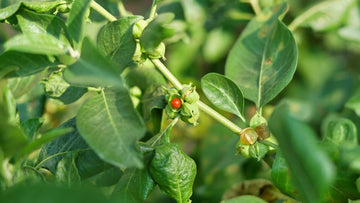Ashwagandha is one of the most fascinating plants in natural medicine. This small root is becoming increasingly popular—and for good reason. Many people today are looking for natural ways to better cope with stress and feel better overall. What exactly is Ashwagandha? It's an adaptogenic herb. That sounds complicated at first, but it simply means: It helps your body cope with stress and get back into balance.
Ashwagandha origin and history
The origins of Ashwagandha are quite impressive. People in India were already familiar with this root over 3,000 years ago. There, it was a true cure-all for all kinds of ailments. The name itself reveals a lot: "Ashwa" means horse, and "Gandha" means smell. And yes, the root does indeed smell a bit horsey. But don't worry, you won't notice any of this in high-quality capsules!
The plant's scientific name is Withania somnifera . It prefers dry regions and therefore grows primarily in India, North Africa, and the Middle East. The bushes look rather ordinary with their small orange-red berries. But the real treasure lies beneath the soil.
What sets Ashwagandha apart from many modern, trendy plants is that it has a truly long history. Ashwagandha's Ayurvedic origins make it so valuable. There, it's called "Rasayana" —which is supposed to mean that it keeps you young and vital.
The most important ingredients

The effectiveness of Ashwagandha is based on a variety of bioactive compounds. The most important are withanolides —steroidal lactones with anti-inflammatory and antioxidant properties. The withanolide content often serves as a quality benchmark for Ashwagandha products.
Key components:
-
Withanolides : Steroidal lactones with strong antioxidant effects
-
Alkaloids : Support the nervous system
-
Choline : Important for brain function and memory
-
Amino acids : building blocks for the body's own proteins
-
Fatty acids : Support cell health and metabolism
Scientific research focuses particularly on withaferin A, which has strong antioxidant properties and may also have anti-cancer properties. This substance contributes significantly to the plant's health benefits.
Ashwagandha effect in the body
Ashwagandha's effects are truly versatile. As an adaptogenic herb, it adapts to your body's current needs. It calms stress and can energize fatigue.
This is how it works in your body:
-
Stress hormone regulation : Lowers cortisol levels — the stress hormone
-
Nervous system : Calms overstimulated nerves, but can also wake up if necessary
-
Hormones : Helps with testosterone levels in men, balances hormonal fluctuations in women
-
Immune system : Makes white blood cells more active
What's particularly exciting is that Ashwagandha directly intervenes in the stress axis, the connection between the brain and the adrenal glands. When this axis is out of sync, we feel stressed and exhausted.
It can also reduce chronic inflammation in the body. This may not sound so exciting, but this silent inflammation is often the cause of many age-related diseases.
Benefits for athletes and active people

Ashwagandha offers special benefits for athletes. What is Ashwagandha for athletes? A natural performance enhancer without the side effects of synthetic substances.
Sport-specific benefits:
-
Endurance improvement : Increases maximum oxygen uptake (VO2 max)
-
Strength gain : Supports muscle building and strength development
-
Faster regeneration : Reduces muscle soreness and shortens recovery times
-
Stress management : Helps to cope with training-induced stress
-
Sleep quality : Improves nighttime rest and regeneration
Studies show that ashwagandha can significantly improve endurance performance by increasing maximum oxygen uptake (VO2 max) (see, for example, Bonilla et al., 2021, Journal of Ethnopharmacology ). This leads to improved respiratory efficiency and increased exercise tolerance. A randomized, double-blind, placebo-controlled study also showed significant gains in muscle strength and mass, as well as a reduction in body fat percentage, in men who performed resistance training and took ashwagandha ( Wankhede et al., 2015, Journal of the International Society of Sports Nutrition ). This makes ashwagandha an ideal supplement for many sports.
Optimal Ashwagandha intake
There are different forms of taking Ashwagandha, each with its own advantages and disadvantages.
The different forms:
-
Capsules
-
Good: Always the same amount, tastes neutral
-
Less good: Takes longer to work
-
powder
-
Good: You can dose it yourself, it mixes well
-
Less good: Tastes quite bitter
-
Drops (tincture)
-
Good: Works quickly
-
Less good: Strong taste, contains alcohol
The correct dosage depends on the individual goal:
-
General well-being : 300-500 mg root extract daily
-
Stress reduction/sports performance improvement : 500-600 mg daily
-
Sleep support : 300-600 mg about one hour before bedtime
The timing of Ashwagandha intake also plays a role. Taking it in the morning can boost energy. Taking it in the evening promotes restful sleep. Combining it with a small meal or some fat improves the absorption of the fat-soluble active ingredients.
Experts recommend cycles of use: six to eight weeks of use, followed by a two-week break. This prevents habituation and maximizes effectiveness.
Possible side effects and precautions

Although Ashwagandha is considered safe, some people may experience stomach upset, diarrhea, or nausea. These side effects usually occur at higher doses.
Special caution applies to:
-
People with autoimmune diseases
-
People with hyperthyroidism
-
Patients with low blood pressure
-
Pregnant and breastfeeding women
-
People before surgical procedures (discontinue 2 weeks beforehand)
Interactions may occur with thyroid medications, blood thinners, and sedatives. Always consult a doctor if you are taking these medications at the same time.
Ashwagandha – a herb with a future
Ashwagandha's millennia-old Ayurvedic origins meet modern science – and pass the test with flying colors! More and more studies confirm what traditional healers have long known: This unassuming root has real potential for your health.
As with all dietary supplements, quality determines effectiveness! Look for high-quality products with standardized extracts and transparent origins. With the right dosage and a little patience, you can experience the full power of this fascinating plant.
Do you have questions about Ashwagandha or other dietary supplements? Our team of experts at MTM Supplements is happy to advise you personally! We will help you find the optimal supplement for your individual needs.
FAQ
Is Ashwagandha suitable for everyone?
No, despite its safety, Ashwagandha is not suitable for every situation. People with certain underlying medical conditions, pregnant women, and those under 18 should consult a doctor.
How long does it take for the Ashwagandha effects to become noticeable?
The effect isn't immediate. For acute stress reduction, initial effects may occur after 1-2 weeks. Significant improvements in sleep, mood, and performance usually occur after 4-8 weeks of regular use.
Can Ashwagandha be taken long-term?
Ashwagandha is generally considered safe for long-term use when taken at the correct dosage. Many users integrate it into their daily routine on a permanent basis. However, experts often recommend cycles of use (e.g., six to eight weeks of use followed by a two-week break) to avoid habituation and maintain full effectiveness.
Can I combine Ashwagandha with other supplements?
Yes, Ashwagandha complements other nutrients well. Particularly effective combinations are created with: magnesium for improved relaxation; vitamin D for immune and bone health; and B vitamins for optimal energy metabolism. However, Ashwagandha should not be taken simultaneously with other strong adaptogens.
What distinguishes high-quality from low-quality Ashwagandha products?
Quality products contain standardized extracts with 5-10% withanolides, are free of contaminants, and are regularly tested. Inexpensive alternatives often use only the leaf powder instead of the root extract or have a low active ingredient content.



